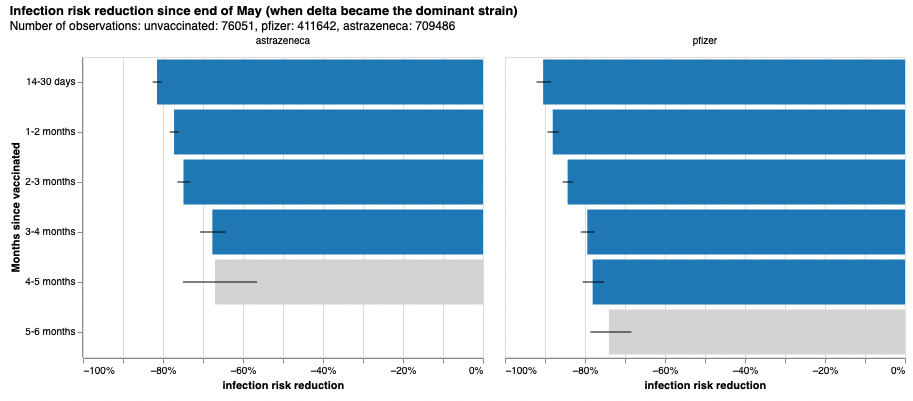The research was based on over 1.2 million test results and participants of the ZOE app who log their input to contribute to ‘real time’ research.
The study indicates that in the worst-case scenario, protection might be reduced to below 50% for healthcare workers, other essential workers and the elderly who were among the first to be vaccinated.
ZOE STUDY leading scientist, Prof Tim Spector commented that in his opinion, the worst-case scenario highlighted above would see healthcare workers and the elderly with a protection drop of below 50% by this winter.
A recent preprint study funded by Pfizer suggested that the efficacy of its vaccine topped at 96.2% after a second dose and reduced to 83.7% after 4 months. However, the ZOE STUDY statistics paint a slightly different picture:
- Initial protection against Covid19 was 88% after the second dose of the Pfizer vaccine, reducing to 74% after 5-6 months suggesting a fall of 14%
- For AstraZeneca, protection against Covid19 was 77% after the second dose falling to 67% in 4 to 5 months
Infection risk reduction since the end of May in AstraZeneca and Pfizer/ZOE

Source: Medscape
What about the Delta Variant?
Clinical trials into vaccine efficacy were conducted before the more contagious Delta variant became the dominant Covid-19 strain. As such, ZOE analysis indicates that a lower level of effectiveness should be expected in a real-world analysis compared with clinical trials. However, ZOE researchers said that individual risk may vary depending on individual fluctuations in the duration of antibodies in their immune system.
Prof. Spector further commented that a potential scenario of higher levels of infection in the UK (resulting from a mixture of loosened social restrictions and a very contagious variant) could mean an increase in hospitalisations and deaths. With this in mind, he called for a decision on rolling out booster vaccines as well as a strategy going forward on vaccinating children.
Other expert views on study findings and predictions
A collective of experts shared their perspectives on the study, starting with Paul Hunter, professor in medicine at the University of East Anglia who, commenting on these findings for the Science Media Centre pointed out a lack of clarity on whether this decline in efficacy is on the basis of symptomatic illness or against severe disease.
Prof Hunter warned a current lack of strong evidence that immunity to severe disease substantially decreases over the same period of time, or that vaccination is less effective at decreasing the likelihood of severe disease from the Delta vs. Alpha variants.
These views were also shared by Dr Peter English, a retired consultant in communicable disease control who pointed out a large gap in the difference between effectiveness against Covid19 and severe disease that requires hospitalisation, intensive care or leads to loss of life.
Lastly, Dr Simon Clarke, associate professor in cellular microbiology at the University of Reading commented on the lack of robust data associated with the claim that immunity levels in healthcare workers and the elderly will reach 50% in December. Nevertheless, he also added and highlighted that the data was “a reminder that we cannot rely on vaccines alone to prevent the spread of COVID.”
Testing for an immune response to the COVID-19 vaccine?
Testing for how your immune system has responded to the COVID-19 vaccine is possible and should include looking at both antibodies and T cells. You can read more about this here and here.






